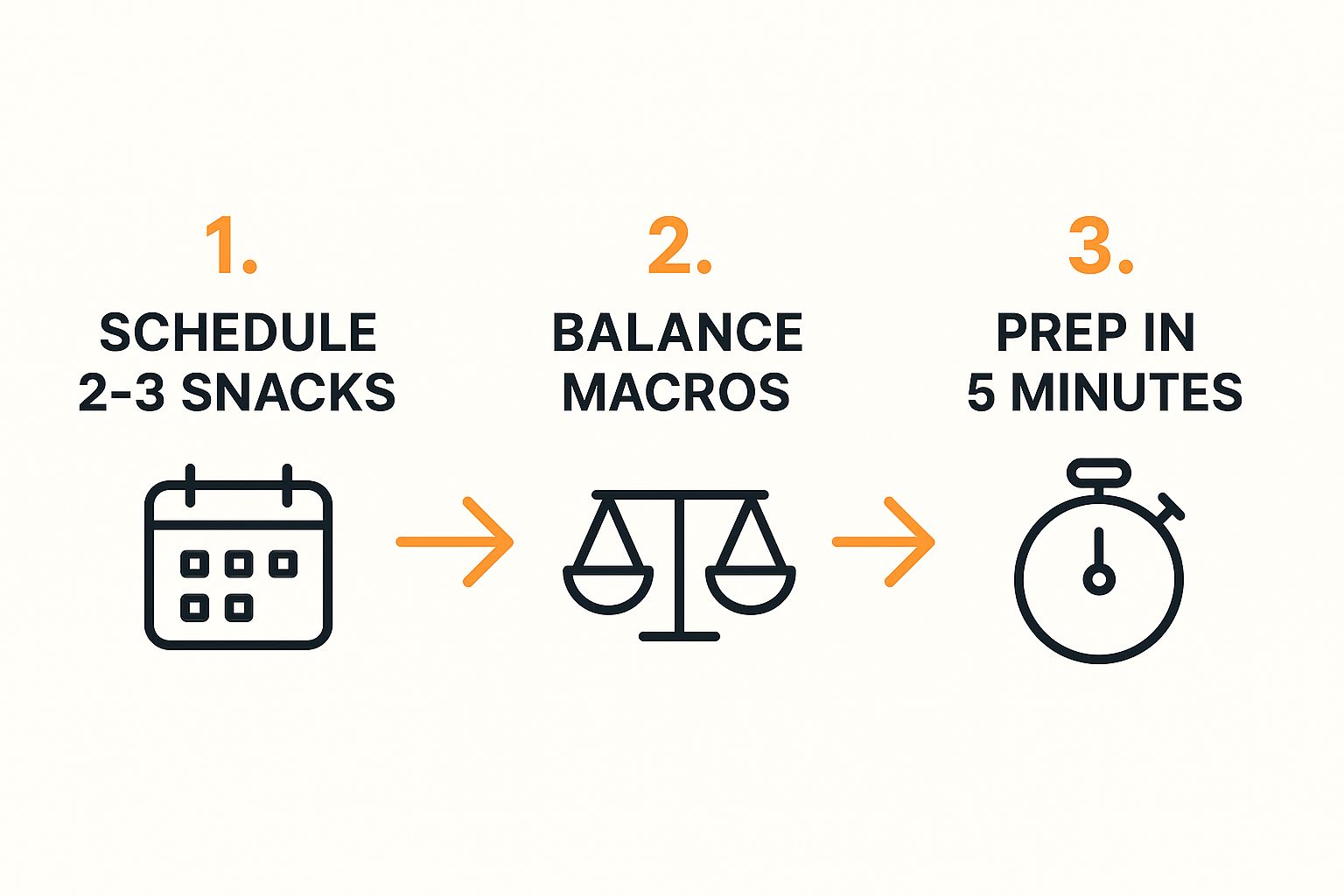To really boost your energy levels for good, you have to get back to basics. It all comes down to four core areas: what you eat, how you move, how well you sleep, and how you handle stress. These aren't just separate habits; they work together to fuel your body, repair damage at a cellular level, and keep your energy-regulating hormones in check.
Why You Are Always Tired and How to Fix It

Let's be honest, feeling constantly drained is exhausting in itself. This isn't just about needing another cup of coffee; it's a sign that there’s a fundamental mismatch between your lifestyle and what your body actually needs to thrive. That persistent fatigue you're feeling is your body's way of telling you that one or more of its key systems is out of whack.
Instead of chasing a quick fix that will only leave you crashing later, understanding the root causes is the only sustainable way to reclaim your vitality. Your daily energy isn't a fluke—it’s a direct result of the lifestyle choices you make every day.
The Four Pillars of Natural Energy
We can break down the most common sources of fatigue into four primary pillars. Each one plays a critical role in how your body produces and uses energy, right down to the cellular level. By addressing them one by one, you create a clear roadmap for lasting improvement.
Before we dive deep into the specific strategies for each pillar, here's a quick overview of our approach.
Four Pillars of Natural Energy Enhancement
A quick look at the core strategies this guide covers for boosting your energy levels without the crash.
| Pillar | Key Action | Primary Benefit |
|---|---|---|
| Nutrition | Stabilize blood sugar and fill nutrient gaps | Consistent, crash-free fuel for your body and brain |
| Movement | Incorporate consistent physical activity | Boost mitochondrial efficiency and improve circulation |
| Sleep | Prioritize high-quality, restorative rest | Allow for physical repair and hormonal regulation |
| Stress Management | Develop effective coping mechanisms | Preserve mental and physical energy reserves |
As you can see, each pillar supports the others, creating a powerful foundation for all-day energy. Let's explore what this means in practice.
- Nutrition: The fuel you put in your tank directly impacts your output. A diet heavy in processed foods sends your blood sugar on a rollercoaster, leaving you sluggish and unmotivated. On top of that, nutrient deficiencies are a common but overlooked cause of fatigue. Sometimes, this exhaustion can even signal an underlying issue that needs a closer look. Learning more about testing for vitamin deficiency can help you pinpoint if specific shortfalls are draining your energy.
- Movement: Physical activity is a fascinating paradox—it uses energy to create more energy. When you move regularly, you strengthen your cardiovascular system, improve blood flow, and supercharge your mitochondria, which are the tiny power plants inside your cells.
- Sleep: This is your body's non-negotiable recovery period. During deep sleep, your body gets to work repairing tissues, consolidating memories, and regulating crucial hormones like cortisol. Skimping on sleep or having poor sleep quality directly sabotages these critical restorative processes.
- Stress Management: Chronic stress keeps your body stuck in a "fight or flight" mode, constantly draining your resources and paving the way for burnout. Learning to manage your stress response is essential for protecting your mental and physical energy reserves.
By focusing on these core areas, you move away from temporary solutions and begin building a foundation for genuine, all-day energy. This guide will provide actionable strategies for each pillar, empowering you to make small, impactful changes that deliver real results. Forget generic advice; it's time for a targeted approach.
Fuel Your Body for All-Day Energy

What you put on your plate is hands down the biggest lever you can pull for your daily energy. Your body is like a high-performance engine—give it premium fuel, and it runs beautifully. But feed it processed foods, sugary snacks, and refined carbs, and you're just asking for sputters and stalls. That's the dreaded afternoon slump in a nutshell.
If you want sustained, all-day energy, the name of the game is blood sugar stability. It's time to shift your focus away from quick-fix energy sources and toward whole foods that provide a slow, steady release of fuel.
Building an Energy-Sustaining Plate
The secret is all about balancing your macronutrients at every single meal. Instead of obsessing over what to cut out, think about what you can add to make your plate work harder for you. Each meal should be a strategic mix of complex carbohydrates, lean protein, and healthy fats.
For example, a breakfast of oatmeal (a fantastic complex carb) topped with walnuts (healthy fat) and a scoop of protein powder (lean protein) will give you a far more stable energy curve than a sugary cereal that sends you crashing an hour later.
A classic mistake is skipping meals to "save" calories. This almost always backfires. An empty tank can't produce energy, which triggers intense cravings for a quick sugar fix, locking you into a vicious cycle of energy spikes and crashes.
The Power of Micronutrients
While macronutrients are the fuel, micronutrients are the spark plugs that actually ignite energy production at a cellular level. Certain vitamins and minerals are absolutely critical for converting the food you eat into usable energy. Without them, your metabolic engine just can't run efficiently.
Three of the most important players for energy are:
- Iron: This is non-negotiable for making hemoglobin, the protein in your red blood cells that ferries oxygen to your tissues and muscles. Low iron means less oxygen, which translates directly to fatigue.
- Magnesium: It's involved in over 300 different biochemical reactions, including the creation of ATP—your body’s main energy currency. It also helps keep your muscles and nerves firing correctly.
- B Vitamins: This whole family of vitamins, especially B12, acts as the support crew for your energy metabolism. They're essential for breaking down carbs and fats into glucose. For anyone dealing with a significant deficiency, options like B-12 injections for energy can be a way to quickly address the shortfall.
Don't just take my word for it. A massive nutritional study confirmed that diets rich in whole grains, lean proteins, and healthy fats are directly linked to having more sustained energy. Complex carbs like oats and quinoa deliver that steady supply of glucose to your brain and muscles, preventing the crashes you get from refined sugars. It's a proven formula.
Don't Forget Hydration
Finally, let's talk about water. Even being mildly dehydrated can cause your energy levels to absolutely plummet. When you're low on fluids, your blood volume drops, forcing your heart to work harder to pump oxygen and nutrients through your system. That extra effort is a massive energy drain.
The key is to drink water consistently throughout the day, not just when you finally feel thirsty. By that point, you're already behind. Keeping a water bottle on your desk is such a simple habit, but it's an incredibly effective way to make sure you stay hydrated and keep your internal engine running smoothly.
The Power of Movement to Boost Vitality

It sounds completely backward, doesn’t it? When you’re feeling wiped out, the very last thing you want to do is move. Yet, one of the best ways to create more energy is to use some.
Physical activity is a powerful energy generator, not a drain. This isn't about pushing yourself through grueling workouts; it’s about using the science of movement to naturally recharge your system.
Regular movement works its magic in a few key ways. For starters, it strengthens your entire cardiovascular system, making your heart and lungs far more efficient. A stronger heart pumps more oxygen-rich blood with less effort, which means your body gets the fuel it needs to function without having to work overtime.
How Movement Builds Your Cellular Batteries
On a microscopic level, physical activity sends a clear signal to your body: build more energy factories.
These tiny power plants inside your cells are called mitochondria, and their job is to convert the food you eat into usable energy. The more you move, the more mitochondria your body creates to meet the demand. You're effectively increasing your total energy capacity.
This is exactly why a consistent walking routine can make you feel more vibrant than spending that same time on the couch. You're literally building a more powerful energy-producing system from the inside out. It's a fundamental principle for anyone looking at ways to improve athletic performance, but it applies just as much to boosting your day-to-day vitality.
Making Movement a Natural Part of Your Day
The goal here is to weave activity into your life, not treat it like a chore. Forget the "all or nothing" mindset that says you need an hour at the gym to make a difference. Small, consistent efforts add up and have a huge impact on how you feel.
Consider these simple swaps to get started:
- Walking Meetings: Instead of sitting in a conference room, take your one-on-one calls while walking outside.
- Stairway Sprints: Always choose the stairs over the elevator. A few flights a day is a surprisingly effective mini-workout.
- Active Breaks: Set a timer to get up, stretch, or walk around for a few minutes every hour. It breaks up the monotony and gets your blood flowing.
By reframing "exercise" as simple "movement," you remove the mental barrier. The focus shifts from high-intensity training to just being less sedentary—a much more achievable goal for a busy lifestyle.
The impact of this approach is well-documented. Research shows that integrating just 150 minutes of moderate exercise per week—think brisk walking or cycling—can dramatically boost energy and slash fatigue.
In one key study, sedentary adults who started a low-intensity exercise program reported a 20% increase in energy levels and a remarkable 65% drop in feelings of fatigue after just six weeks. It's a powerful reminder that a little movement goes a very long way.
Master Your Sleep for Maximum Energy
Sleep isn't just downtime; it’s the most critical performance-enhancing activity you can do. Think of it as your body's dedicated maintenance crew, clocking in every night to handle the essential repairs that are impossible to do while you're awake. This is when your brain literally flushes out metabolic junk, your muscles rebuild, and your entire hormonal system gets a hard reset for the next day.
And when we talk sleep, most people fixate on the number of hours. But quality is the real game-changer here. Tossing and turning for eight hours won't do you nearly as much good as seven hours of deep, uninterrupted rest. True quality sleep is what fuels cellular repair and hormonal balance—the non-negotiables for feeling sharp and energized.
Create a Relaxing Wind-Down Routine
You can't just slam on the brakes after a full-speed day and expect your brain to instantly power down. Just like you warm up before a workout, you need a cool-down routine for sleep. A consistent wind-down ritual sends a powerful signal to your brain and body that it's time to start preparing for rest, making that transition into sleep feel natural instead of forced.
This doesn't have to be some elaborate, hour-long ceremony. A killer routine can be as simple as:
- Reading a physical book: Ditching the screen helps your mind detach from the day's chaos without the stimulating blue light that messes with your sleep hormones.
- Light stretching or foam rolling: Releasing physical tension in your muscles can be a surprisingly effective way to quiet your mind.
- Journaling: Spend just five minutes jotting down whatever is on your mind. This "brain dump" can stop thoughts from spinning on a loop when your head finally hits the pillow.
The real magic is in the consistency. Do the same calming things in the same order every night, and you’ll create a powerful psychological trigger that tells your brain, "Okay, it's time to sleep."
Optimize Your Bedroom for Total Darkness
Your body's internal clock—your circadian rhythm—is incredibly sensitive to light. Even tiny amounts from a streetlamp peeking through the blinds or the glowing numbers on your alarm clock can suppress melatonin, the hormone that signals your body it's nighttime. Making your bedroom a pitch-black cave is one of the biggest levers you can pull for better sleep quality.
Look into getting a solid set of blackout curtains or even just a comfortable sleep mask. Put some tape over any glowing electronic lights. The goal is to turn your bedroom into a true sanctuary for rest, totally free from any form of light pollution.
So many people treat weekends as a chance to "catch up" on sleep. While it feels good at the moment, a wildly fluctuating sleep schedule just confuses your internal clock. That groggy, jet-lagged feeling you get on Monday morning? That's the price you pay. Sticking to a consistent wake-up time, even on weekends, is one of the most powerful things you can do to regulate your body's rhythm for peak performance all week long.
The science is crystal clear on this: sleep deprivation is a direct line to daytime fatigue. The National Sleep Foundation recommends adults get 7 to 9 hours of quality sleep per night for their brains and bodies to function properly. One major analysis found that people sleeping less than six hours a night had a 32% higher risk of significant fatigue compared to those getting a full night's rest. Just dialing in your sleep hygiene can boost your subjective energy levels by around 25% in only a few weeks. You can explore more data about how fundamental factors impact our well-being at ourworldindata.org.
Stop Stress from Draining Your Energy
Chronic stress is the silent saboteur of your energy reserves. It keeps your body locked in a constant state of ‘fight or flight,’ endlessly pumping out hormones like cortisol and adrenaline. While that response is great for escaping immediate danger, having it on a low simmer all day, every day, depletes your physical and mental resources, leading straight to burnout.
Think of it like leaving your car's engine revving in the driveway 24/7. Sooner or later, you’re going to run out of gas. In the same way, chronic stress drains your body's fuel tank, leaving you feeling wiped out even when you haven't done much. Getting a handle on this daily drain is non-negotiable for preserving your precious energy.
Calm Your Nervous System in Minutes
One of the most powerful tools you have to fight back against stress is your own breath. When you're stressed out, your breathing naturally becomes shallow and rapid. By consciously slowing it down, you send a direct signal to your nervous system that it's safe to stand down. It’s an incredibly practical way to hijack your body’s stress response on the spot.
Deep-breathing exercises can actually lower your cortisol levels in just a few minutes. Try this simple but effective technique:
- Inhale slowly through your nose for a count of four.
- Hold your breath for a count of seven.
- Exhale completely through your mouth for a count of eight.
- Repeat this cycle three to five times.
This isn't just a relaxation trick; it's a physiological reset. By changing your breathing pattern, you actively shift your body out of its high-alert state and into a mode of rest and recovery, immediately stopping the energy drain.
Reconnect with Nature to Recharge
Another incredibly effective way to dial down stress is to simply get outside. Being in nature has a measurably calming effect on the mind and body. Whether it’s a quick walk in a local park, sitting on your porch with a cup of tea, or getting your hands dirty in the garden, exposure to a natural environment helps lower cortisol and lift your mood.
The goal here is to unplug from the constant digital noise and reconnect with something more grounded. It’s such an easy and accessible strategy for anyone looking to plug the mental leaks that leave them feeling exhausted.
Shift Your Mindset to Preserve Energy
Finally, don't underestimate how much your thoughts influence your energy levels. A constant cycle of negative thinking or relentless worry is a massive mental drain. Learning to reframe those thoughts can make a world of difference.
Practicing gratitude is a simple but powerful way to shift your focus. At the end of each day, take just a moment to write down three specific things you're thankful for. This small habit helps train your brain to notice the positive, which reduces the mental energy you spend on stressors and preserves it for what truly matters.
Your Action Plan for Lasting Energy
Knowing what to do is one thing, but actually putting it into practice? That's a completely different ballgame. The biggest mistake I see people make is trying to overhaul their entire life overnight. It's a recipe for burnout.
The real key to success is focusing on tiny, sustainable changes that create momentum. Think small. Start with just one or two new habits for the first week. For example, instead of ditching your entire diet, just commit to adding a source of lean protein to your breakfast every morning. Once that feels like second nature, then you can add something else.
This simple infographic is a great visual for how to prep energy-sustaining snacks ahead of time.

As you can see, a little bit of scheduling, balancing, and prepping makes healthy snacking a seamless part of your routine instead of an afterthought.
A Sample Week to Get You Started
To make this super tangible, here’s a simple structure you can borrow and adapt. Remember, the goal here is progress, not perfection.
- Movement Monday: Schedule three 10-minute walks into your day. I like to do one before work, one at lunch, and one right after dinner. It breaks up the day and feels totally manageable.
- Hydration Tuesday: Grab a big water bottle, fill it up, and keep it on your desk. Your only goal for the day is to refill it at least twice. That's it.
- Wind-Down Wednesday: An hour before bed, put your phone away. Just for tonight. Instead, pick up a physical book and read for 15 minutes.
- Thoughtful Thursday: The moment you start to feel that familiar wave of stress, stop. Take just two minutes to practice the 4-7-8 breathing exercise. It's a game-changer.
- Fuel-Up Friday: Before the weekend hits, prep a few simple, protein-rich snacks. Hard-boil a few eggs or portion out some almonds into small bags so they're ready to grab and go.
This is a journey, not an overnight fix. I highly recommend keeping a simple journal to track how you feel each day. Noting down your energy levels helps you see the small wins, which keeps you motivated and gives you the confidence to finally take back control of your energy for good.
Common Questions About Finding Your Energy
Even with a solid plan, you're bound to have some questions. It’s totally normal. Here are some straight answers to the things people usually ask when they start working on getting their energy back the natural way.
How Long Until I Actually Feel a Difference?
This is the big one, right? While you might feel an immediate mood lift from something like a quick walk, the deeper, more stable energy you're looking for takes a bit more time. You'll likely notice small, encouraging improvements in the very first week.
But for a significant, lasting shift in your baseline energy, you should give it about two to four weeks of consistent effort. Your body needs that time to recalibrate. It's busy adapting to new habits, repairing cells, and establishing healthier hormonal patterns. Patience is your best friend here.
Don't get bummed out if you don't feel like a completely new person overnight. We're not building a temporary fix; we're building sustainable energy by stacking small, positive habits, one day at a time.
Can Any Supplements Genuinely Help?
Yes, a few supplements can definitely be helpful, but think of them as your support crew, not the main event. They should always complement a healthy lifestyle, not try to replace it.
A few that often make a real difference are:
- Iron: Absolutely crucial if you have a diagnosed deficiency. Low iron is a direct cause of deep, persistent fatigue.
- B-Complex Vitamins: These vitamins are the spark plugs for your metabolism, helping your body convert the food you eat into fuel your cells can actually use.
- Adaptogens: Herbs like ashwagandha are fantastic for helping your body get better at managing stress. This prevents cortisol from constantly draining your energy reserves.
It's absolutely essential to talk to a healthcare provider before starting any new supplement. They can make sure it’s safe for you and won't interfere with anything else you're taking.
If I Can Only Change One Thing, What Should It Be?
Life gets busy, I get it. If you have to pour all your effort into a single area, make it sleep quality. Hands down, it's the most powerful change you can make.
Getting 7-9 hours of high-quality rest is the foundation for everything else. It’s when your body and brain do their most important repair work. When you improve your sleep hygiene—things like setting a consistent bedtime and ditching screens an hour before you turn in—it creates a powerful ripple effect. You’ll make better food choices, feel more motivated to move, and find it way easier to handle whatever stress the day throws at you.
At Elite Bioscience, we provide targeted therapies to support your wellness goals, helping you feel your best from the inside out. Discover how our vitamin and peptide treatments can complement your journey to renewed vitality. Explore our solutions at https://elitebioscience.co.







